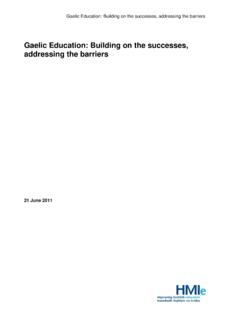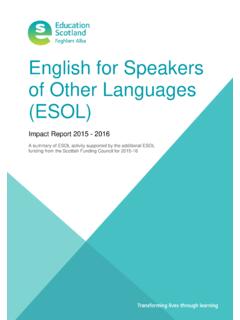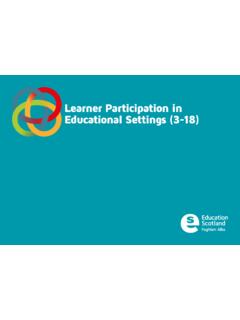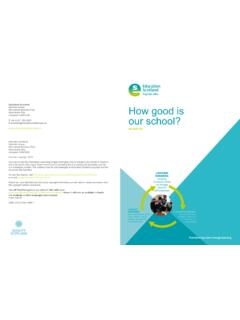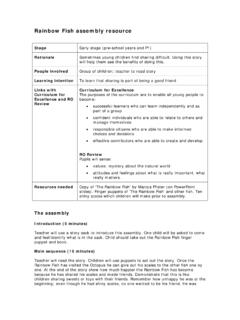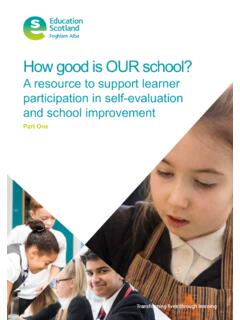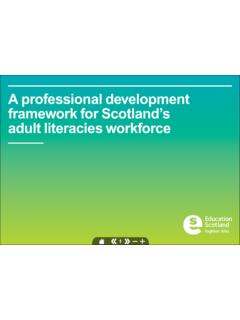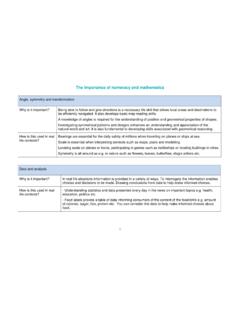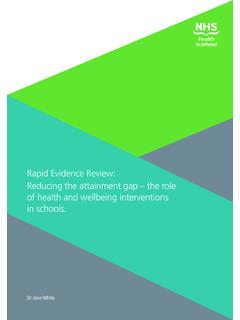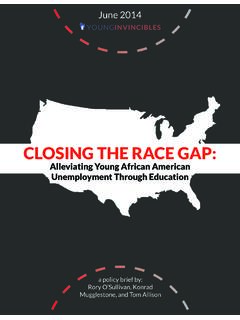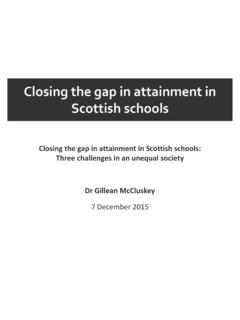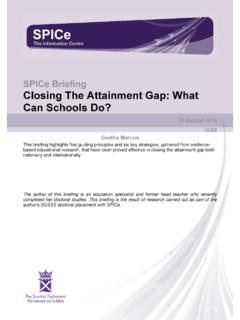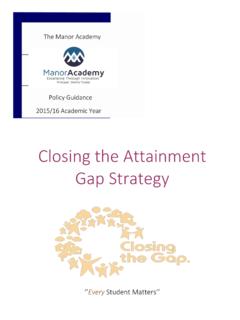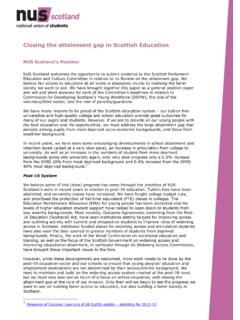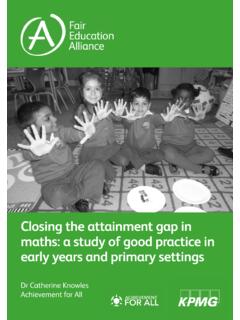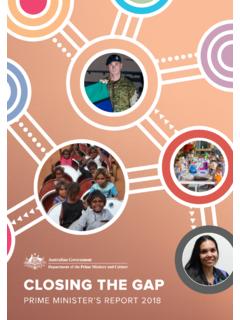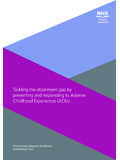Transcription of How well are we improving learning, raising attainment and ...
1 How well are we improving learning, raising attainment and closing the poverty related attainment gap? A framework to evaluate how well local authorities are improving learning, raising attainment and closing the poverty related attainment gap January 2018 2 | 1. Evaluating local authorities approaches to improving learning, raising attainment and closing the poverty related attainment gap The National Improvement Framework (NIF) sets out Scotland s vision for the future: Excellence for all and equity for children and young people . It works towards realising the Scottish Government s ambition for Scotland to be the best place to grow up. To achieve the best outcomes there is a need to raise attainment and reduce educational inequity for all of Scotland s children and young people.
2 attainment (including achievement) is the measurable progress which children and young people make as they advance through and beyond school. However, there continues to be a gap between the progress which is made by those living in Scotland s least and most deprived areas. In rural areas, there is a need to evidence that deprivation and poverty in communities has been identified with appropriate targeting of provision. The First Minister launched the Scottish attainment Challenge in February 2015. Its aim is to accelerate the pace in which Scotland closes the poverty related attainment gap in literacy, numeracy, health and wellbeing through leadership, families and communities and learning and teaching.
3 To support the challenge and bring a greater sense of urgency and priority to the issue additional funding is available for local authorities through the attainment Scotland Fund. Local authorities are involved in the Scottish attainment Challenge in different ways. Nine local authorities are part of the challenge authority programme; twelve local authorities have schools involved in the schools programme. All local authorities have access to the universal offer and almost all schools have been provided with Pupil Equity Funding to support work to close the poverty related attainment gap. closing the poverty related attainment gap is complex and poses challenges to the system regarding how to evaluate the impact of the work being undertaken and the use of the significant public funding.
4 Nevertheless, there is a clear requirement to ensure public money is helping to improve learning, raise attainment and close the poverty related attainment gap. The Standards in Scotland s Schools etc. Act 2000 places a duty on HM Inspectors, either at the request of Scottish Ministers or at such intervals as appear to be appropriate, to inspect an education authority in order to review the way in which the authority is exercising its functions in relation to the provision of school education (Section 9). It is important to evaluate how well additional funding is being used to support programmes which help to improve learning, raise attainment and close the poverty related attainment gap.
5 To this end, HM Inspectors of Education work with colleagues from Audit Scotland to focus on how well additional finance from the Scottish attainment Challenge and Pupil Equity Funding is being managed and the impact it is having on relevant groups of children and young people. 3 | 2. Rationale for including Educational Psychological Services (EPS) in the Inspection of Local Authorities Between 2006 and 2011, HMIE undertook the inspection of all 32 local authority educational psychology services in Scotland. In March 2011, following the completion of the full round of inspections, HMIE published Educational psychology in Scotland: making a difference1. During 2011 to 2014, HM Inspectors worked with EPS to support improvement.
6 However, it was acknowledged that more robust and up to date evidence was required to: Inform the Area Improvement Plans as part of the shared risk assessment process managed by Audit Scotland; fulfil the Currie (2002) recommendation that EPS should be inspected by HM Inspectors to ensure public accountability and build capacity for improvement; and provide evidence to Ministers, particularly in relation to Section 4 of the Education (Scotland) Act 1980 ( the 1980 Act ) which requires education authorities to provide a psychological service for their area and sets out the functions of that service (which includes for example the study of children with additional support needs).
7 A validated self-evaluation model was developed in partnership with the profession, managers and ADES to enable ES to fulfil the above requirements. More recently, the National Scottish Steering Group for Educational Psychology negotiated with the Scottish attainment Challenge Implementation Steering group, funding for training of Educational Psychologists. A requirement of the funding was to provide robust evidence of the impact made by educational psychologists and services in achieving equity and excellence for all and closing the poverty related attainment gap. It was agreed that EPS should be integrated into the ILA inspections designed to inspect the nine Scottish attainment Challenge authorities.
8 It was agreed that this would be an effective use of time, reduce workload on local authorities by preventing duplication of scrutiny activity, and fulfil Scottish Government policy drivers. The approach will allow a thematic overview of the effective interventions used by educational psychologists to improve outcomes for children and young people. 4 | 3. The Framework for Evaluating the Quality of Services and Organisations This document is based on the Framework for Evaluating the Quality of Services and Organisations (known as the Overarching Framework). This framework is the basis of many models for evaluation across the public and third sector.
9 It provides a systematic structure for self-evaluation. It is firmly based on the principle that the most effective way of improving standards of service is to use a combination of rigorous evidence-based self-evaluation alongside independent external inspection. The Overarching Framework is generic. It does not assume a particular organisational structure, type or size. It can be used in its entirety, or selected and adapted so that key quality indicators (QIs) and themes reflect the purpose of individual organisations, and meet the specific needs of their stakeholders. Adapted QIs can also be used selectively for external scrutiny or validation. The framework can also be used thematically by extracting key QIs or elements for a specific purpose.
10 This document looks specifically at how well councils are improving learning, raising attainment and closing the poverty related attainment gap and therefore focuses on the QIs most relevant to this area. The Overarching Framework is organised under six high-level themes which enable systematic evaluation of the quality of services across ten inter-related key areas. The six high-level themes focus first on the demonstrable outcomes and impact of the organisation or service, and then look at the key areas which contribute to these outcomes. 4. A Framework to support the evaluation of progress in improving learning, raising attainment and closing the poverty related attainment gap The QIs highlighted in this document will help identify strengths and signpost areas for improvement.
